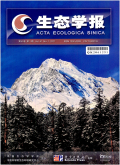生态学报2024,Vol.44Issue(22):10133-10145,13.DOI:10.20103/j.stxb.202311172504
青藏高原高寒草地食草家畜碳收支动态
Carbon budget of herbivorous livestock on alpine grassland over the Qinghai-Tibet Plateau
摘要
Abstract
The alpine grassland is the major land cover on the Qinghai-Tibet Plateau(QTP),which not only supports the livelihoods and livestock production of local herdsmen but also plays an important role in maintaining ecosystem security on the regional scale.As key elements in the system of grassland and human societies,herbivorous livestock has its carbon budget and carbon cycle from grassland to human societies,which are not well quantified at present.This study used the livestock data from the county yearbook to quantify the carbon budget of herbivorous livestock on the QTP from 2000 to 2020.The ratio of carbon intake was quantified based on the available grass yield(GYA)and net primary productivity(NPP)estimated by remote sensing.The results showed:(1)the multi-year averaged total NPP and GYA were(153.88±17.96)Tg C/a and(26.40±3.19)Tg C/a from 2000 to 2020,respectively.The carbon intake of herbivorous livestock(ITC)was(31.08±0.98)Tg C/a(accounting for 118%of total GY4).(2)The NPP,GYA,and ITC of grasslands on the QTP showed a significant increasing trend,but the ratio of ITC to GYA showed a significant decreasing trend.Meanwhile,this ratio showed heterogeneity in spatial(such as different grassland types and different regions).(3)About 43%of the total intake was excreted through feces and urine equating to 13.24 Tg C/a,while 12.35 Tg C/a and 0.96 Tg C/a were released through respiration in heat production and CH4 in belch by herbivorous livestock,respectively.The carbon of 4.53 Tg C/a was finally sequestered in the livestock body and the partial carbon of 0.384 Tg C/a was exported to human society as livestock products.This study quantified the carbon budget and its spatial and temporal dynamics of livestock on the QTP based on the herbivorous physiological metabolism,which is of great significance for grassland management,carbon sequestration in grasslands and global change ecology.关键词
食草家畜/动物碳代谢模型/碳摄入量/畜产品/可利用产草量Key words
herbivorous livestock/animal carbon metabolism model/carbon intake/livestock products/available grass yield引用本文复制引用
欧阳熙煌,王军邦,赵亮,王文颖,张振华,周华坤,赵新全..青藏高原高寒草地食草家畜碳收支动态[J].生态学报,2024,44(22):10133-10145,13.基金项目
第二次青藏高原综合科学考察研究项目(2019QZKK0302-02) (2019QZKK0302-02)
青海省帅才科学家负责制项目(2024-SF-102) (2024-SF-102)
国家自然科学基金项目(31971507) (31971507)
中国科学院-青海省人民政府三江源国家公园联合研究专项(LHZX-2020-07) (LHZX-2020-07)

